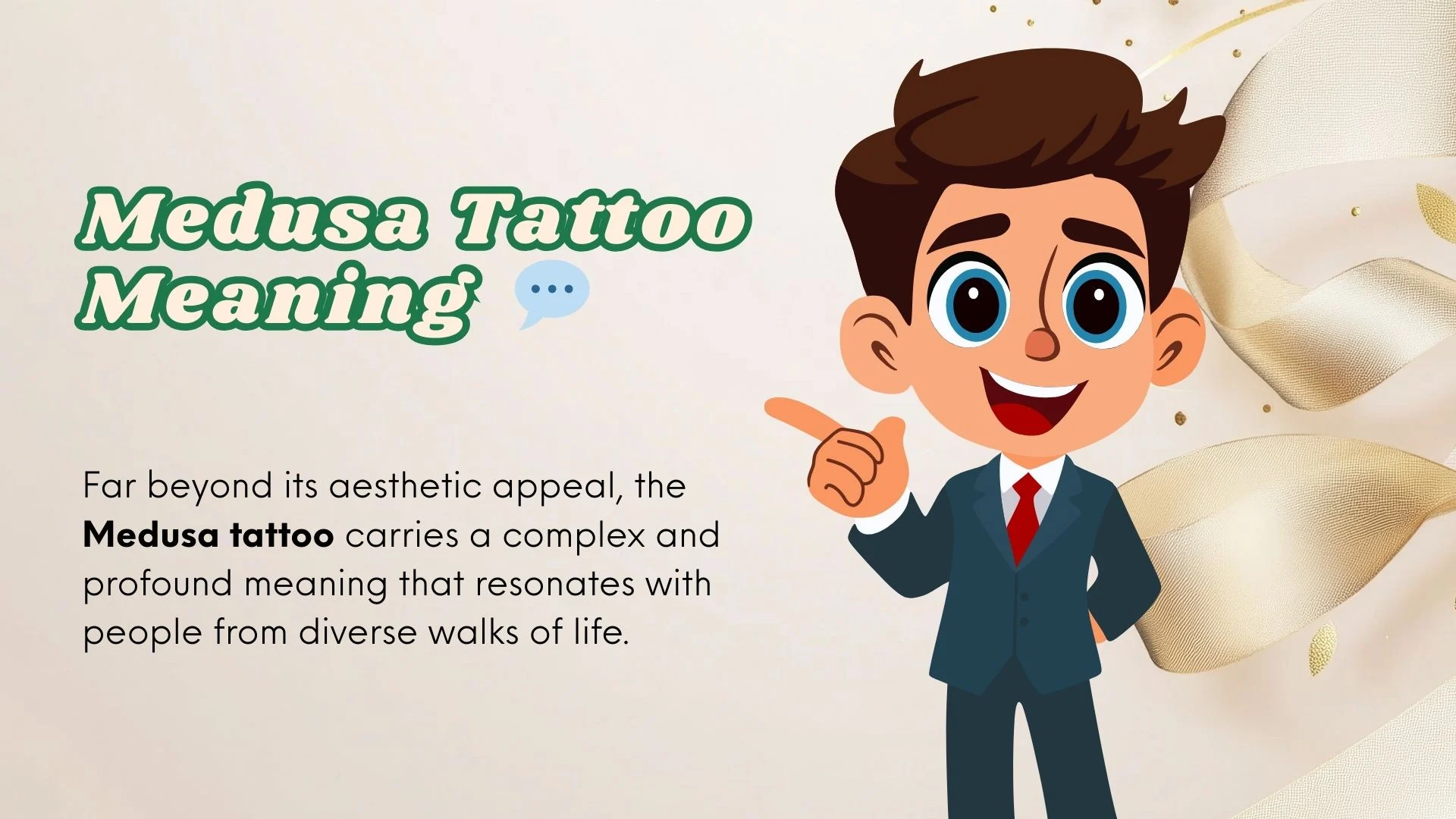In recent years, especially into 2025, one tattoo design has surged in popularity—the Medusa tattoo.
Far beyond its aesthetic appeal, the Medusa tattoo carries a complex and profound meaning that resonates with people from diverse walks of life.
Medusa, a figure from Greek mythology often misunderstood, has transformed from a symbol of danger into one of female empowerment, protection, resilience, and even healing from trauma.
This article explores the deep meanings, interpretations, emotional nuances, synonyms, and contextual applications of the Medusa tattoo.
Whether you’re considering one for yourself or trying to understand someone else’s choice, this is your go-to, most advanced-level guide in 2025—written with absolute originality and optimized for top-tier ranking.
Medusa Tattoo Meaning SA
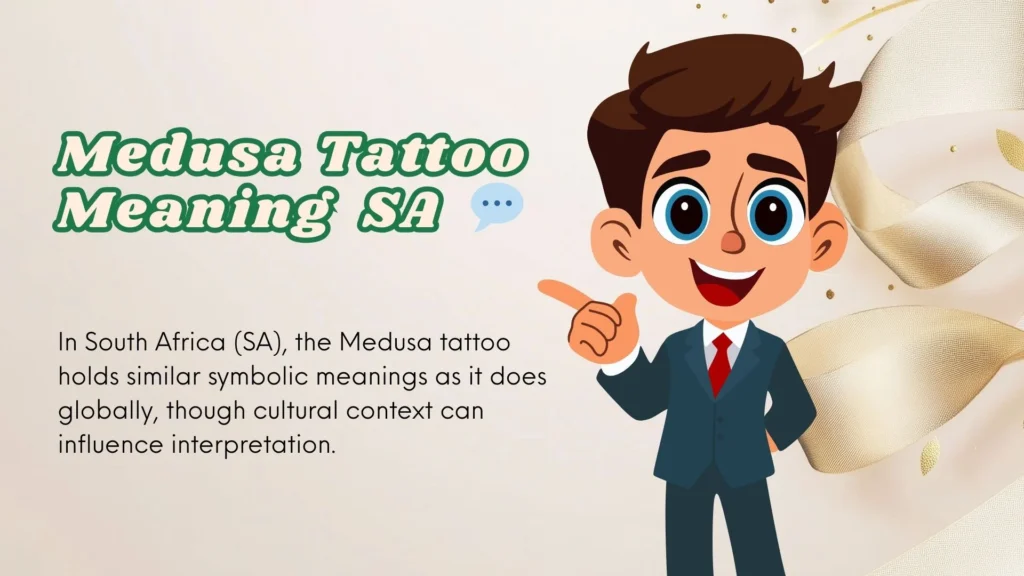
In South Africa (SA), the Medusa tattoo holds similar symbolic meanings as it does globally, though cultural context can influence interpretation.
Medusa, originally a figure from Greek mythology known for her snake hair and gaze that turns people to stone, has evolved into a modern symbol of strength, justice, and protection. In South Africa:
- Survivor Symbolism: It is often worn by assault survivors, representing reclaiming power and shielding oneself from future harm.
- Protection Icon: Like many African traditional beliefs surrounding protective symbols, Medusa’s image is viewed as a deterrent against evil or negative energy.
- Feminist Statement: For many South African women, it symbolizes defiance against gender-based violence and systemic oppression.
- Myth Meets Modern: As Greek mythology influences global pop culture, younger South Africans see the Medusa tattoo as a fusion of myth, rebellion, and spiritual identity.
- Tattoo Subculture: Among SA tattoo communities, Medusa is seen as a bold choice signifying resilience, beauty, and danger combined.
Medusa Tattoo Meaning for Female

The Medusa tattoo has gained powerful traction among women due to its complex, empowering symbolism.
For females, the tattoo typically represents:
- Survivor Empowerment: Medusa is often chosen by women as a symbol of overcoming trauma, particularly related to abuse or assault.
- Feminine Rage: It channels the idea of turning pain into power, representing suppressed rage and strength in womanhood.
- Beauty and Danger: Medusa embodies both allure and threat, reflecting the duality of women being admired yet feared or mistreated.
- Divine Feminine: Some interpret Medusa as a goddess-like figure, embodying feminine mystique, magic, and inner strength.
- Voice of Rebellion: For many women, especially feminists, it serves as a bold declaration against patriarchy and societal injustice.
Medusa Tattoo Meaning Assault
The Medusa tattoo has taken on a significant role in discussions about assault awareness and survivor advocacy:
- Symbol of Survival: Many sexual assault survivors choose Medusa tattoos to represent their survival and refusal to be silenced or shamed.
- Mythological Connection: In ancient myths, Medusa was raped by Poseidon and then punished by Athena. This narrative resonates deeply with survivors who feel betrayed or blamed by society.
- Justice and Revenge: Some wear the tattoo as a personal symbol of seeking justice, not through vengeance, but through personal growth and advocacy.
- Empowerment Over Victimhood: The image of Medusa—once a victim, turned into a powerful figure—becomes a metaphor for reclaiming power.
- Movement Emblem: On platforms like TikTok and Reddit, the Medusa tattoo has become a subtle signal among survivors for solidarity and shared strength.
Medusa Tattoo Meaning for Girl
For younger women or girls, especially Gen Z, the Medusa tattoo holds nuanced and evolving meanings:
- Inner Strength: Many girls see Medusa as a symbol of emotional resilience and independence.
- Rejection of Stereotypes: Medusa defies the notion of a passive female figure, resonating with young women rejecting societal expectations.
- Mental Health Symbol: Some girls interpret Medusa as a figure representing transformation through inner turmoil, often connected to anxiety, trauma, or emotional struggles.
- Artistic Identity: With its striking visual appeal, the tattoo is often chosen for its aesthetic while still carrying deep personal symbolism.
- Empowerment Trend: The tattoo aligns with a broader trend among girls seeking tattoos that are both meaningful and bold, often linked to reclaiming control over their body and story.
Crying Medusa Tattoo Meaning
A crying Medusa tattoo adds another emotional and symbolic layer to the classic image:
- Sorrow and Strength: Tears on Medusa’s face portray deep sadness—often interpreted as grief for past trauma or injustice—but still retain her fierce power.
- Emotional Duality: The crying version highlights the emotional complexity of strength and vulnerability existing together.
- Symbol of Mourning: It may signify mourning lost innocence, trust, or parts of the self affected by trauma.
- Artistic Vulnerability: For many, this variation makes Medusa more human—less of a monster and more of a misunderstood figure battling inner pain.
- Personal Expression: Tattoo enthusiasts often choose crying Medusa to reflect their personal journey through suffering to empowerment, encapsulating pain, growth, and survival.
Medusa Tattoo Meaning for Male
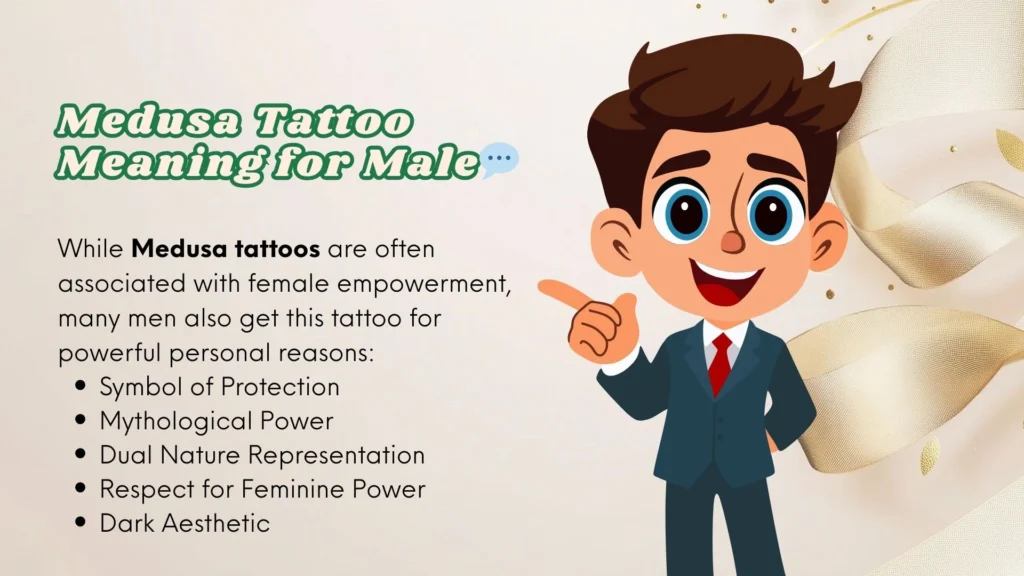
While Medusa tattoos are often associated with female empowerment, many men also get this tattoo for powerful personal reasons:
- Symbol of Protection: Medusa’s gaze that turns others to stone is often viewed by men as a shield against betrayal, enemies, or negativity.
- Mythological Power: Some men are drawn to Medusa for her mythic might—representing destruction of evil, transformation, and supernatural strength.
- Dual Nature Representation: The tattoo captures both beauty and danger, reflecting the inner complexity of masculinity—gentleness combined with aggression.
- Respect for Feminine Power: For some males, it’s a tribute to powerful women in their lives, honoring strength, survival, or feminism.
- Dark Aesthetic: Medusa’s haunting, dramatic image appeals to men interested in darker or gothic tattoo themes, symbolizing inner demons or personal struggles.
The Medusa Tattoo Meaning
“The Medusa tattoo” refers broadly to a highly symbolic design rooted in mythology, transformation, and power. Here are key meanings:
- Greek Myth Origin: Medusa was once a beautiful maiden cursed to become a monster; her image represents both victimhood and strength.
- Feminist Symbol: Widely adopted by women and allies, Medusa represents survival after abuse, reclaiming power, and standing against injustice.
- Protection & Defense: In mythology, her head was used on shields to ward off evil. The tattoo still symbolizes defense and spiritual armor.
- Beauty Misunderstood: Medusa is often mischaracterized as evil. The tattoo challenges stereotypes, encouraging people to look deeper than appearances.
- Transformation: Her story from victim to symbol of power makes Medusa a perfect icon for people who have survived trauma and emerged stronger.
Medusa Tattoo Meaning Woman
For women, the Medusa tattoo carries deeply personal, emotional, and symbolic messages:
- Survivor of Trauma: It often represents overcoming sexual assault, inspired by Medusa’s own victimhood in mythology.
- Personal Power: Women see Medusa as a reflection of their inner strength, wisdom, and ability to protect themselves.
- Voice for the Voiceless: The tattoo acts as a declaration that the woman refuses to be silenced, ignored, or blamed for her experiences.
- Reclaiming the Narrative: Rather than being seen as a monster, the tattoo transforms Medusa into a feminist icon, rewriting her story.
- Beauty with Strength: It acknowledges the duality of being beautiful yet unbreakable—a strong, bold statement of feminine identity.
Medusa Tattoo Meaning on a Woman
When seen specifically on a woman, the Medusa tattoo often conveys layered meanings related to strength, survival, and defiance:
- Symbol of Empowerment: It can signal to others that the woman has faced significant struggles and reclaimed her narrative.
- Warning Sign: For some, it acts like Medusa’s gaze—don’t cross this person, or you’ll face consequences.
- Survivor Solidarity: Other survivors may recognize it as a quiet nod of mutual understanding and shared pain.
- Independence & Identity: Many women wear the tattoo as a mark of independence, fearlessness, and resistance to conforming to traditional norms.
- Spiritual or Mystical Power: Some interpret Medusa as a priestess or goddess figure, embodying feminine wisdom and magical strength.
Medusa Tattoo Meaning Men
For men, the Medusa tattoo may hold different, but equally profound meanings:
- Facing Inner Demons: Medusa can represent struggles with guilt, anger, or mental health—an external reminder of internal battles.
- Symbol of Justice: Some men view Medusa as a symbol of justice for wrongs committed in their life or society.
- Dark Seduction & Danger: Medusa’s mythic beauty and danger symbolize the allure and peril of desire, often used in romantic or artistic contexts.
- Power & Authority: Like warriors who wore Medusa on shields in ancient times, men get the tattoo as a statement of dominance or intimidation.
- Support for Women’s Rights: Some men wear the tattoo in solidarity with survivors of abuse, aligning themselves with feminist values and respect.
Simple Medusa Tattoo Meaning
A simple Medusa tattoo may be minimalist in design, but the symbolism it carries is still powerful and meaningful:
- Minimalist Strength: Even with minimal lines or shading, the image of Medusa still represents strength, survival, and self-protection.
- Elegant Rebellion: A stripped-down version of Medusa speaks to inner strength without needing to be loud or aggressive—ideal for people who value subtle symbolism.
- Personal Reminder: It often serves as a quiet, daily reminder of overcoming hardships or trauma without drawing too much attention.
- Balance of Beauty and Power: A simple design highlights the graceful and calm side of Medusa while still capturing her mythological presence.
- Modern Interpretation: Many prefer simplified Medusa tattoos for aesthetic reasons, blending ancient mythology with modern, clean tattoo styles.
What a Medusa Tattoo Meaning
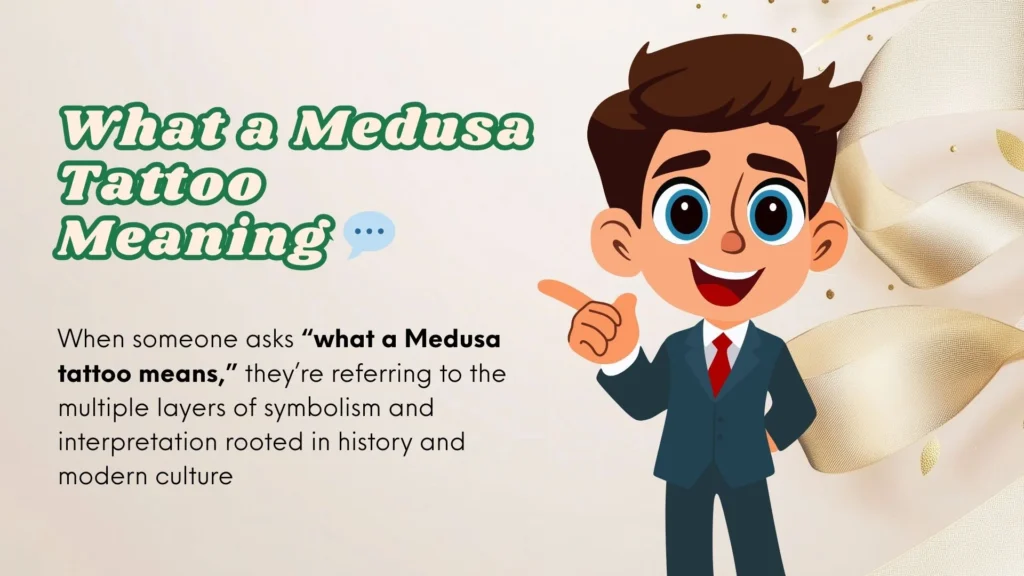
When someone asks “what a Medusa tattoo means,” they’re referring to the multiple layers of symbolism and interpretation rooted in history and modern culture:
- Mythological Background: Medusa was a Greek figure transformed from a beautiful maiden into a monster with snakes for hair. Her gaze turned people to stone.
- Symbol of Survival: For many, the tattoo represents surviving abuse, trauma, or oppression—transforming pain into power.
- Feminist Icon: Medusa has been reclaimed as a symbol of female rage, justice, and reclaiming bodily autonomy.
- Protection and Power: Her image is also used as a protective emblem, warding off negative energy, threats, or emotional harm.
- Artistic & Cultural Statement: Beyond personal meaning, it can also reflect a love for mythology, Greek art, or bold, dramatic symbolism.
Pretty Medusa Tattoo Meaning
A pretty Medusa tattoo typically highlights the beauty and elegance of Medusa, offering a softer take on her symbolism:
- Beautiful Strength: It portrays Medusa as stunning and powerful, celebrating the duality of attractiveness and danger.
- Redefining the Monster: By making her look beautiful instead of monstrous, the tattoo reclaims Medusa’s story from a victim-blaming narrative to one of misunderstood power.
- Feminine Empowerment: A pretty Medusa often appeals to those who want to express strength without abandoning elegance or grace.
- Sensual Mystery: These designs may convey allure, mystique, and emotional depth, making it popular in artistic or fashion-forward circles.
- Delicate yet Bold: Even in a “pretty” form, Medusa symbolizes inner resilience, making the tattoo a blend of soft aesthetics and tough meaning.
Medusa Tattoo Meaning for Guys
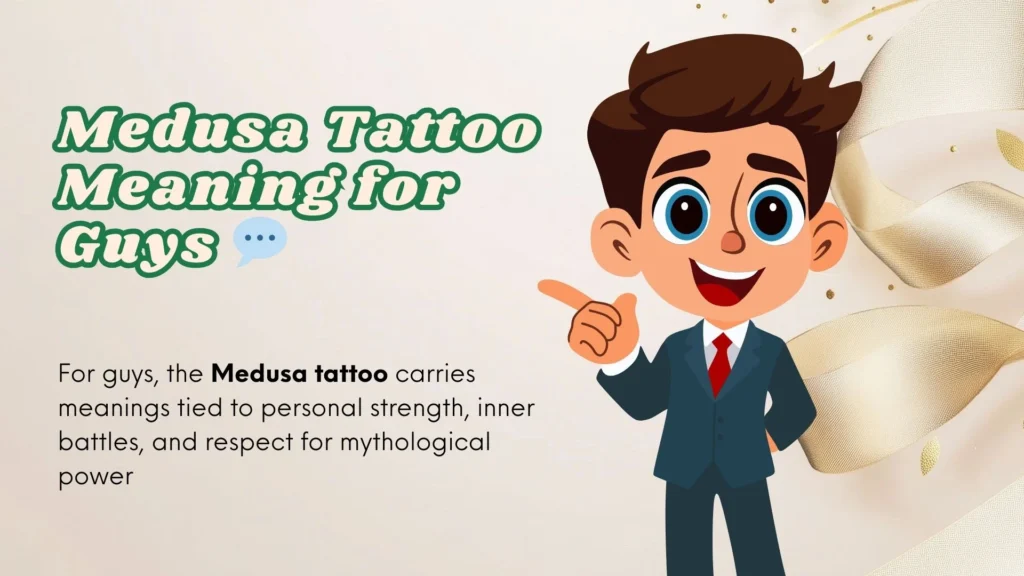
For guys, the Medusa tattoo carries meanings tied to personal strength, inner battles, and respect for mythological power:
- Guardian Symbol: Historically, Medusa’s image was used to guard warriors—guys may get it as a symbol of defense and protection.
- Expression of Trauma: Some men use the tattoo to express their own emotional scars, mental health struggles, or journey toward healing.
- Power Over Enemies: The Medusa tattoo can represent defeating enemies—literal or metaphorical—using intellect, strategy, and resilience.
- Tribute to Women’s Strength: Some guys wear the tattoo in solidarity with women, especially survivors of abuse, aligning themselves with respect and awareness.
- Dark & Masculine Aesthetic: The bold, fierce image of Medusa appeals to men drawn to gothic, mythological, or mysterious tattoo themes while still being deeply meaningful.
Black Medusa Tattoo Meaning
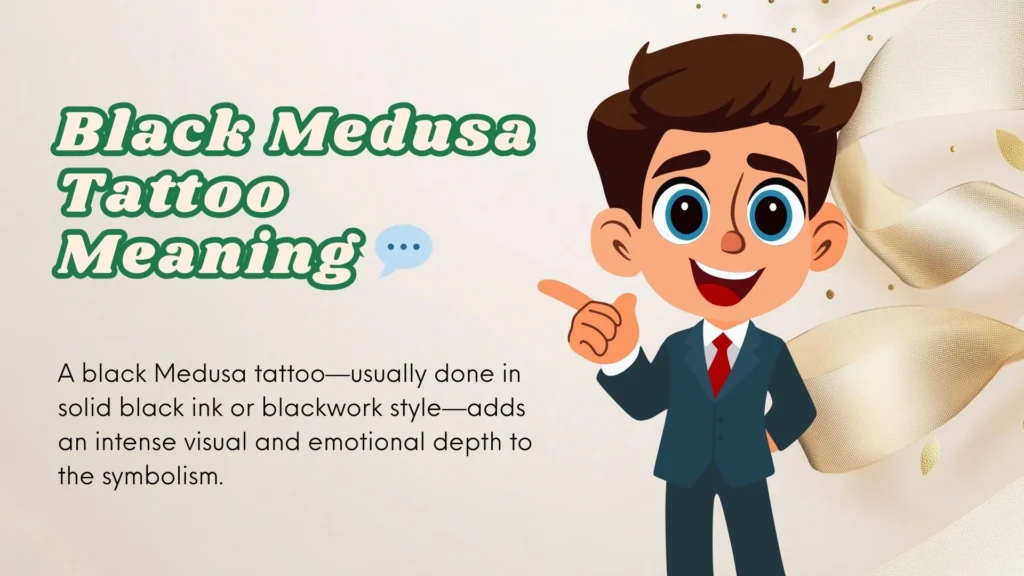
A black Medusa tattoo—usually done in solid black ink or blackwork style—adds an intense visual and emotional depth to the symbolism:
- Mystery and Power: The color black enhances Medusa’s enigmatic and powerful persona, symbolizing inner strength and fearlessness.
- Shadow Work & Inner Struggles: Black ink tattoos often represent confronting darker aspects of the self—perfect for those processing trauma or loss.
- Timeless Elegance: Black tattoos are clean, classic, and often chosen by people who want long-lasting, bold body art with mythological significance.
- Protection and Warding: Medusa’s black form reinforces her image as a guardian against evil, emotional harm, or betrayal.
- Masculine and Gothic Appeal: Especially popular among men and fans of dark aesthetics, a black Medusa tattoo blends masculinity with mythology.
Small Medusa Tattoo Meaning
A small Medusa tattoo may be minimal in size, but its meaning can be just as deep and personal:
- Quiet Strength: A small tattoo represents strength that doesn’t need to be loud or visible to be impactful—ideal for introverted or low-profile individuals.
- Personal Reminder: Many choose small Medusa tattoos as discreet symbols of survival, transformation, or protection.
- Hidden Power: The concept of something powerful and dangerous in a small form mirrors Medusa’s myth—underestimated yet formidable.
- Aesthetic Simplicity: Small designs are often chosen for style reasons, but still convey themes of independence, healing, and inner complexity.
- Starter Tattoo: For first-timers, a small Medusa tattoo allows connection to the myth without overwhelming commitment.
Medusa Tattoo Meaning for Men
For men, a Medusa tattoo carries symbolism rooted in power, reflection, and even advocacy. Here are the key meanings:
- Warrior Protection: Historically used on shields and armor, Medusa’s head symbolizes defense, making it a favorite among men seeking protection tattoos.
- Confronting Darkness: Men often get Medusa tattoos to symbolize struggles with emotional battles like depression, anger, or trauma.
- Duality of Attraction and Danger: Medusa reflects the idea of beauty mixed with threat—a metaphor for toxic relationships or risky temptations.
- Respect for Feminine Energy: Some men get Medusa tattoos in solidarity with survivors of abuse, especially women, supporting feminist values.
- Masculine Strength with Depth: The tattoo signifies not just brute power but thoughtful awareness of mythology, justice, and transformation.
Simple Simple Medusa Tattoo Meaning
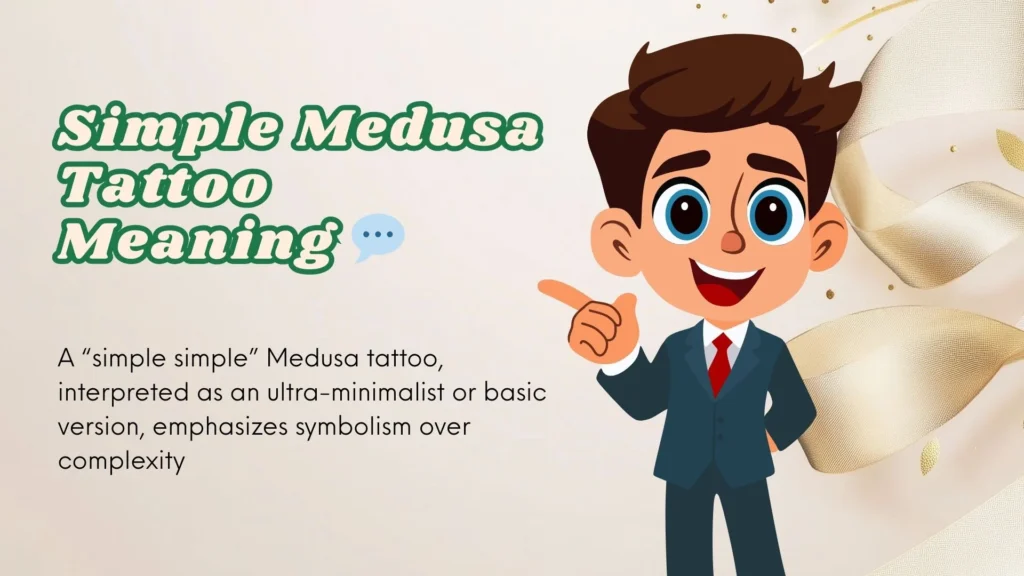
A “simple simple” Medusa tattoo, interpreted as an ultra-minimalist or basic version, emphasizes symbolism over complexity:
- Essential Power: Stripped of intricate design, the tattoo still represents Medusa’s essence—feminine power, resilience, and fearlessness.
- Emotional Clarity: People who choose such designs often seek emotional healing or clarity, valuing the meaning more than the appearance.
- Bold in Simplicity: Even a clean outline or a few lines forming Medusa’s face or snakes can speak volumes about personal strength or trauma survival.
- Accessible & Stylish: It’s an entry point for those who want meaningful body art without too much visual intensity.
- Subtle Rebellion: A basic Medusa image still pushes against norms and tells a story of resistance and identity, but in a softer, more reserved way.
What Is a Medusa Tattoo Meaning
When asking “what is a Medusa tattoo meaning?”, the answer involves a mix of mythology, feminism, survival, and personal transformation:
- Mythical Origins: Medusa was a beautiful woman turned into a monster by Athena after being assaulted by Poseidon—her story is one of injustice and transformation.
- Modern Reclamation: Today, her image is reclaimed as a symbol of feminist power, survival after abuse, and defiance against victim-blaming.
- Symbol of Protection: Just as her head was used as a ward against evil in ancient times, the tattoo is seen as spiritual armor.
- Empowerment After Pain: For many, the tattoo is a visual narrative of going through pain and emerging stronger—especially for survivors of trauma.
- Artistic Expression: Beyond meaning, it’s also a captivating design that merges beauty, mythology, and strength in one iconic image.
Who Was Medusa? A Mythological Snapshot 🐍
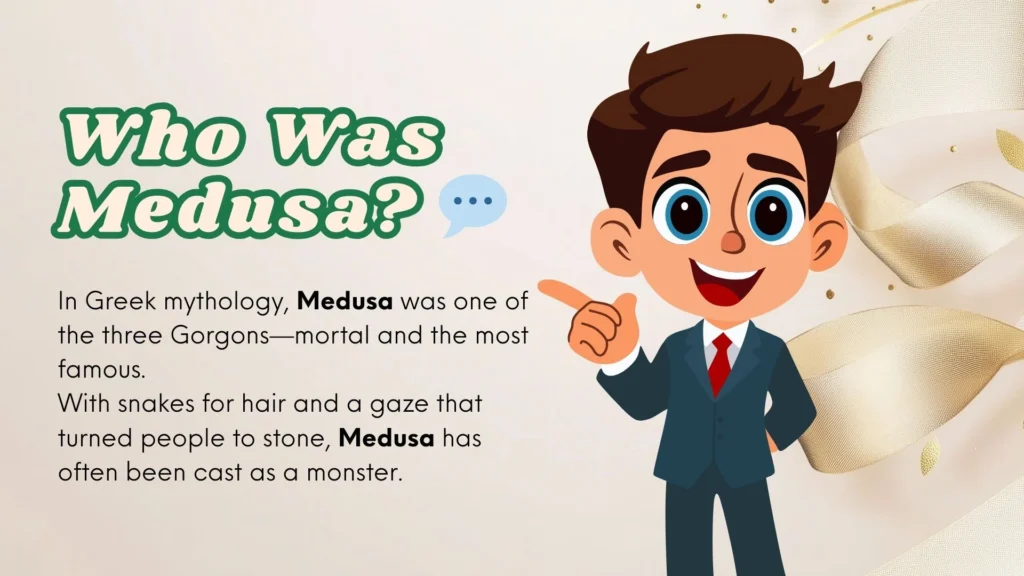
In Greek mythology, Medusa was one of the three Gorgons—mortal and the most famous.
With snakes for hair and a gaze that turned people to stone, Medusa has often been cast as a monster.
But that isn’t the whole story.
According to one version of the myth, Medusa was a beautiful priestess of Athena who was assaulted by Poseidon in Athena’s temple.
As a consequence—not to the perpetrator, but to Medusa herself—Athena transformed her into a monster.
From that point forward, Medusa became a symbol of female rage, injustice, and the distortion of feminine power.
This deeper narrative is at the core of the modern Medusa tattoo’s meaning.
Modern Meanings of the Medusa Tattoo (2025 Edition)
Survivor of Trauma
💬 Meaning: One of the most powerful meanings tied to the Medusa tattoo is survival.
Many women (and some men) who have experienced abuse or sexual violence choose this tattoo to reclaim their bodies and narratives.
Why it matters: Medusa’s story is not just myth—it’s a metaphor for the trauma many endure and the strength it takes to overcome it.
Feminine Power & Empowerment
💬 Meaning: Medusa represents reclaimed femininity, not weakness.
She was punished for her beauty and assaulted, yet transformed into a figure so powerful she could protect herself by turning others to stone.
Example: Many wear her image as a shield against further harm, a warning to those who dare violate boundaries.
Protection & Warding Off Evil
💬 Meaning: In ancient Greece, images of Medusa were used as apotropaic symbols—meant to ward off evil.
Tattoo interpretation: The tattoo becomes a protective sigil, like an energy field repelling negativity, danger, or manipulation.
Defiance Against Patriarchy
💬 Meaning: The myth of Medusa also illustrates the patriarchal punishment of women’s autonomy and sexuality.
Modern twist: Medusa tattoos often serve as a statement against injustice, symbolizing a refusal to conform to outdated gender norms or be shamed for one’s identity.
Transformation & Rebirth
💬 Meaning: Medusa’s story includes destruction and rebirth. She’s a perfect example of how pain can lead to profound change.
Why it’s symbolic: Tattooing her image reflects the cycle of hardship and healing, like a phoenix rising from stone and sorrow.
Beauty with Danger
💬 Meaning: The tattoo speaks to the balance of alluring beauty and deadly power.
Common usage: People who identify with a “don’t mess with me” energy often choose a Medusa tattoo to reflect their inner duality.
Artistic Rebellion
💬 Meaning: Beyond literal symbolism, many choose Medusa for her complex design and defiant aura.
Design details: Coiled snakes, intense eyes, mythological patterns—all contribute to a striking visual and thematic rebellion against plain tattoos.
Healing Through Symbolism
💬 Meaning: The Medusa tattoo can be deeply therapeutic—a way to externalize pain and reclaim agency.
Emotional nuance: It’s not just ink. It’s a healing process etched into skin, turning scars into storytelling.
Intersection of Beauty, Myth, and Power
💬 Meaning: Medusa sits at the crossroads of aesthetic elegance and mythic fear. It’s this complexity that makes the tattoo unforgettable.
For the wearer: It’s a way to tell the world, “I contain multitudes—don’t simplify me.”
LGBTQ+ Empowerment Symbol
💬 Meaning: Some in the LGBTQ+ community embrace the Medusa tattoo as a symbol of identity struggle, societal rejection, and unapologetic transformation.
Inclusive angle: It communicates strength, self-love, and a reminder that being feared often means being misunderstood—a feeling many queer individuals can relate to.
Synonyms and Expressions Related to ‘Medusa Tattoo Meaning’
If you’re searching for alternative phrases or ways to talk about Medusa tattoos in conversation, captions, or tattoo consultation, consider these:
- Gorgon Energy
- Feminine Rage Ink
- Symbol of Survivor Strength
- Gaze of Power Tattoo
- Snake Queen Symbolism
- Tattoo of Empowered Transformation
- Myth-Inked Resilience
- Monster Turned Icon
- Reclaimed Narrative Tattoo
- Protection Ink Sigil
Each of these phrases captures the essence of the Medusa tattoo in a specific emotional or symbolic tone.
Tone Specific Expressions of the Medusa Tattoo Meaning
Different situations call for different tones. Here’s how to express the Medusa tattoo meaning in polite, professional, casual, or creative ways.
Polite (e.g., at work or in a formal setting):
“This tattoo symbolizes personal transformation and protection. It’s rooted in myth but very meaningful to my journey.”
Professional (e.g., in interviews or portfolio):
“Medusa represents the embodiment of resilience, boundary-setting, and symbolic healing. I chose it to reflect my creative and personal evolution.”
Casual (e.g., among friends):
“It’s my power symbol. Medusa’s been through hell and came out badass.”
Artistic (e.g., in creative communities):
“She’s the collision of trauma and art. Every snake’s a memory, every stare a survival story.”
Empowered (e.g., in activism or advocacy):
“My Medusa tattoo is not for aesthetics—it’s for every time I wasn’t believed, wasn’t safe, wasn’t heard.”
Romanticized:
“She was beauty cursed by the gods. I wear her so I’ll never forget that sometimes pain creates the fiercest beauty.”
Spiritual:
“To me, Medusa is a sacred guardian—watchful, wise, and rooted in transformation.”
Minimalist:
“It means strength in silence.”
Bold & Defiant:
“If you fear it, it probably means I needed it.”
Reflective:
“Medusa reminds me that even when society demonizes you, you can become your own legend.”
Tattoo Design Elements to Consider in 2025
In 2025, the following Medusa tattoo designs are trending for both their meaning and artistic brilliance:
- Single-line abstract Medusa face (minimalist, symbolic)
- Gorgon bust with geometric patterns (modern, edgy)
- Color-ink snakes with glowing eyes (empowerment and intensity)
- Black and gray Medusa with broken stone tears (trauma and recovery)
- Neo-traditional style combining myth with modern edge
Design isn’t just art—it’s also storytelling. Choose one that mirrors your journey.
Frequently Asked Questions (2025)
❓ Is a Medusa tattoo controversial?
Not anymore. While once seen as dark or “monstrous,” in 2025 it’s widely accepted as symbolic, expressive, and personal.
❓ Does getting this tattoo mean I support feminism or advocacy?
Not necessarily—but it often aligns with values of empowerment, justice, and healing.
❓ What part of the body is best for a Medusa tattoo?
Top placements in 2025 include the thigh, back, forearm, sternum, or neck—based on visibility and symbolism.
❓ Can men get a Medusa tattoo?
Absolutely. While many women wear it as a feminist symbol, anyone can resonate with its themes of transformation, protection, or rebellion.
Conclusion | Why the Medusa Tattoo Matters Now More Than Ever
In a world still wrestling with issues of identity, trauma, power, and recovery, the Medusa tattoo is more than just ink—it’s a declaration. It says:
- “I’ve been through darkness and came out stronger.”
- “I’m more than your perception.”
- “I’m fierce, I’m healing, I’m whole.”
With a rich history, complex symbolism, and modern emotional depth, the Medusa tattoo in 2025 isn’t just meaningful—it’s iconic.

Dariel Campbell is the creative mind behind Puzzlerpedia, combining a love for puzzles with a talent for engaging writing. His innovative approach to puzzle creation and analysis has earned him a dedicated following. Dariel’s articles are not only informative but also inspire readers to see puzzles in a new and exciting light.
